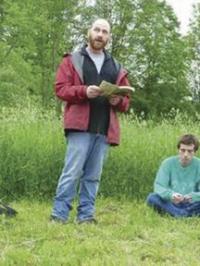
Serving the Vermont Champlain Valley Area for 45 Years
Main SectionsFront Page SportsValley VitalsIt's in the StarsStarwiseArchivesLinksAbout The VoiceContact Us |
On the Land and Tredding Alternative Educational Journeys: The Walden Experience
Tuesday September 10, 2013 By Cookie Steponaitis “We are all schoolmasters and our schoolhouse is the universe. To attend chiefly to the desk or schoolhouse while we neglect the scenery in which it is placed is absurd.” Henry David Thoreau, Journal, 15 October, 1859 Though Thoreau lived in the nineteenth century he would feel right at home if he stepped forward in time and on to the alternative educational program known as the Walden Project. Now in its thirteenth year, this unique educational pathway is a joint venture between Vergennes Union High School and the Willowell Foundation. While the Walden students do board a bus to begin their school day, once transported to the land site in Monkton, Vermont, the structure or a traditional school day falls away to a model based on the concepts of Henry David Thoreau, blending structure and freedom. “I think we provide context and support for them to design their own education through meaningful encounters with a diverse cross-section of people in the community,” expressed Walden Director Matt Schlein.” We give our students license to create and a freedom to choose. We do, however, expect them to be responsible with their freedom. For example, a student apprenticing with a local poet is expected to produce a meaningful chapbook about poetry or some other evidence that reflects their learning over the semester. Another student focusing on art might have a chance to work with a local artist and produce a public showing of their work. The size of the group allows us to converse with students individually about their passions, interests, and goals after high school. Through these initial conversations we help them tailor their time at Walden to meet their goals as a learner. “ Based not only in Thoreau’s teachings, but in the Humanities, environmental sciences, philosophy and is based on student centered inquiry. Linking traditional curriculums of Science, English, Math, and History, Walden students are taught to ask critical questions and engage in problem solving that utilizes verbal/linguistic, logical/mathematical, visual/spatial, body/kinesthetic, musical/rhythmic, interpersonal and intrapersonal styles of learning. Not only engaged in the tight knit learning community of Walden itself, the students are also out in and a part of the local and state community. While the typical day at Walden does not resemble its traditional counterpart, it places the student on the land, engaged in nature and in the learning of not only their own studies but those of their peers. Classes taught on the land include social and environmental studies, creative writing and field sociology, social and environmental classes, community meetings and life stories, and internships. Many Walden students also take courses from Community College of Vermont and other institutions of higher learning. Walden asks students to engage in three essential questions, inspired by Thoreau's time in the woods: what is my relationship to my self? What is my relationship to my community? What is my relationship to the natural world? In order to support students wrestling with these questions, the Walden schedule includes both structured class time and opportunities for students to pursue individual interests and passions. Walden staff work with students to make connections between their personal interests and the curriculum, and make sure we spend time each week conferencing with students. Each individual student's experience of Walden will be different than his or her peers. It is really something students create rather than "do" and I think recognizing this helps staff support students as they take charge of their education.
|
AdvertisementsSearch our Archives |
Agricultural Weather Forecast:

© 2006-18 The Valley Voice • 656 Exchange St., Middlebury, VT 05753 • 802-388-6366 • 802-388-6368 (fax)
Valleywides: [email protected] • Classifieds: [email protected] • Info: [email protected]

 Printer Friendly
Printer Friendly